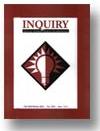"Critical thinking is thinking correctly for oneself that successfully leads to the most reliable answers to questions and solutions to problems" (Schafersman, 1994). While there are several types of thinking styles, scientific thinking is the method by which one uses scientific method to study or investigate nature or the universe. One must not be a scientist to practice scientific thinking. The application of scientific method and its precepts is used in scientific thinking.
The components of scientific thinking are observation, hypothesis, experimentation, and verification or validation. The process by which one thinks scientifically is deliberate and planned. Scientific thinking uses empirical evidence, or evidence that can be "sensed" since this evidence can be experienced by others and can be repeated and therefore proven. Empirical evidence is used by scientific thinkers to make important decisions and reach responsible or sound conclusions (Schafersman, 1994).
In contrast, creative thinking uses "brainstorming" and "starbusting" by which many thoughts are expelled in no formal manner.
In brainstorming random thoughts are used to produce more ideas with no foundation or premise. Scientific evidence is not required in creative thinking.
Logical thinking using deductive and inductive reasoning differs from scientific thinking in that several premises are formed and a conclusion results but is not guaranteed or proven. Thus scientific thinking is the only thinking drawn from proven research and validation of knowledge and can be repeated by anyone practicing it.
Creative thinking sees ideas with fresh, new insight. One way in which critical thinking can be used creatively is in the use of metaphors, an "implied comparison of two things" (Kirby and Goodpaster, 2007). An example would be of a hard rain: "it's raining cats and dogs". Metaphors are an important part of our language, used often by great orators and writers to emphasize a point or...


